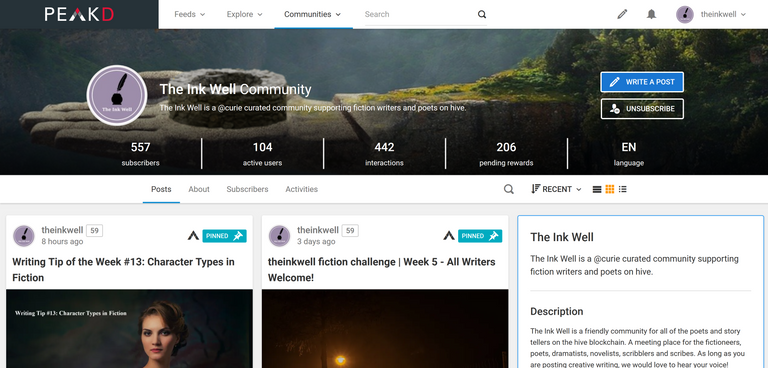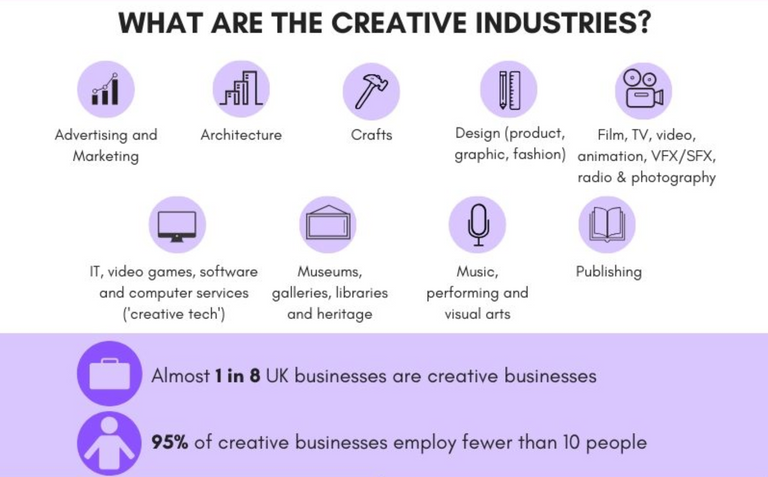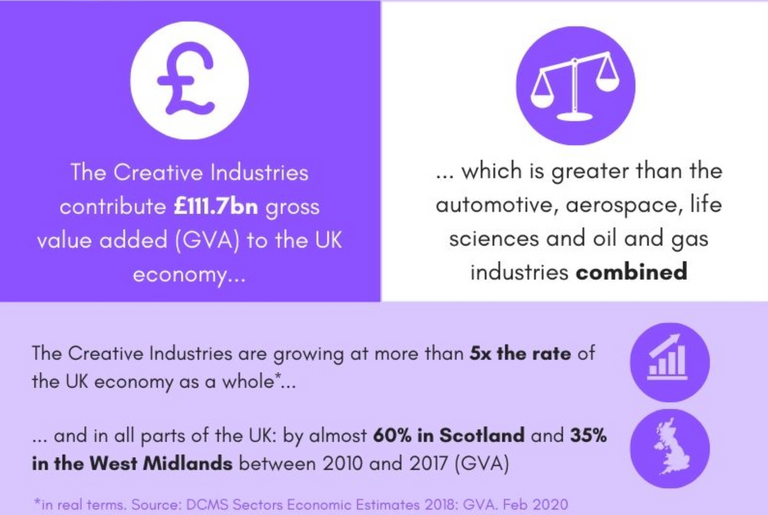
The Ink Well Community on PeakD on the Hive blockchain - read the June newsletter
A little while ago, I posted about becoming an Orca. This feels great and it feels great most of all because I feel I can start moving more into what I want to do on Hive. I mentioned that I had some new plans and targets and today I want to talk about one of them.
With the advent of communities and innovations like tipping on PeakD, it has become much easier to focus on specific developments for Hive. About eight weeks ago, I became part of the leadership team for The Ink Well community, home of creative writing on the Hive blockchain. I was excited by the potential that The Ink Well offers to become a go-to destination on the Internet for stunning fiction and poetry.
This is one of a series of articles that will look at how we take The Ink Well and its writers and the technology of blockchain in general and PeakD in particular from where it is now to a thriving alternative economy for writers and readers. An economy that operates outside the current establishment, provides writers with an independent income and sustains literature free from censorship.
The articles and the feedback gained through them will inform a business proposal to bring outside investment to Hive. This will be used to fund the development process to attract and retain new users of hive: to recruit, develop and support an inter-related community of readers and writers. There are public resources in the UK to support this type of activity, although the final funding package may include other types of private and individual investors, too.
Although I am writing about the UK, because that's where I am and where I have connections to writers, readers and potential investors, the things I am writing about have a much wider application:
Some observers take the view that creativity is the defining characteristic of developed 21st century economies, just as manufacturing typified 19th and early 20th centuries. (David Parrish)
This first article looks at the external environment and starts to expose the structural holes that create opportunities for disruptive technologies like blockchain. Please feel free to comment and re-blog to increase exposure and discussion.
Creative Industries in the United Kingdom
The UK invests in creative and cultural industries as a way of enabling the country to maintain its competitive edge in global markets. For many years now, both India and China have been producing more graduates than the total number of children born in the UK. Much of competitiveness is moving towards the efficiencies of technology. The focus on creative and cultural industries is because they are competitive industries which are not easy to replicate or replace using technology. On the contrary, technology can enhance and amplify creative endeavours.
The creative industries are the fastest growing part of the UK economy. They are defined by the UK government as “those industries which have their origin in individual creativity, skill and talent and which have a potential for wealth and job creation through the generation and exploitation of intellectual property”. Creative Industries Federation

- The creative industries export £46bn in goods and services worldwide and account for 12% of UK services exports.
- Jobs in the UK's creative industries are growing at three times the UK average.
- A third of the sector's workforce are self-employed.
- The creative industries employ over 2 million people in the UK (about 6% of working people) and are projected to create an additional 1 million jobs by 2030.
- Global talent has been vital to the sector's world leading reputation, innovation and economic success.

The Hive blockchain has several thriving niche communities for the creative industries including film, photography, music, visual arts and crafts and a supporting token, creative coin. This post focuses on The Ink Well community of creative writers and the publishing industry and the new affordances blockchain brings to create wealth.
The term ‘cultural industries’ is also used by some agencies, though this term relates to a more specific range of industries and can be regarded as a subset of the creative industries. The cultural industries are defined by UNESCO as ‘industries that combine the creation, production and commercialisation of contents which are intangible and cultural in nature; these contents are typically protected by copyright and they can take the form of a good or a service.’ (David Parish)
Publishing in the United Kingdom
Between 100,000 and 200,000 people are employed through the publishing industry, with each worker estimated to generate £112,800 Gross Value Added - or twice the UK average. There are over 2,000 publishing enterprises, including 170 academic presses, and nearly 60% of income is generated from exports.
UK publishing also provides the source material for many of the other creative industries, especially television, film, theatre and musicals helping to reduce the risk and increase the success of creative productions.
A report for the Publishers Association by Frontier Economics estimates that productions that originated as books generated 44 per cent more in UK film box office revenue (and 53 per cent more globally); 58 per cent higher viewership of ‘high-end’ TV productions; and nearly three times more ticket sales for theatre productions. (The Creative Industries UK).
The publishing industry in the UK is dominated by the big five:Penguin Random House, Simon & Schuster, Hachette, HarperCollins and Macmillan. These, in turn, are dominated by white, privately educated individuals which fail to represent the regional and racial diversity of the UK, and especially of London, where all the major publishing houses are located and where more than 40% of the population is from Black, Asian and Minoritised Ethnicities (BAME) communities.
There has been some challenge to the establishment recently with the formation of the Black Writers' Guild by publisher Sharmaine Lovegrove, journalist Afua Hirsch and author Nels Abbey, and which counts major Black authors from Malorie Blackman to Bernardine Evaristo among its members. In response,
the “big five” UK publishing houses have separately acknowledged that “change is not happening fast enough” and that they must do a lot more to address racial inequalities in the books world ... including an audit of books published by black authors and of black publishing staff, and for the companies to address the lack of black executives on their boards. (The Guardian, June 2020)
Rethinking Diversity in Publishing, the first in-depth academic study in the UK on diversity in trade fiction, and published by Goldsmiths Press, found the following:
- assumptions about audiences being white and middle-class still prevail, which is the only audience the big publishers are interested in.
- publishers still see writers of colour as a ‘commercial risk’.
- Black, Asian and minority ethnic and working-class audiences are undervalued by publishers, economically and culturally, impacting on the acquisition, promotion and selling of writers of colour.
- comping practices, when books deemed similar are compared to others as a predictor of sales, create obstacles that privilege established authors and restrict ‘new voices’.
- continued ambiguity of ‘diversity’ as both a moral and economic imperative.
Writing in the Report's foreward, 2019 Booker Prize winner, Bernardine Evaristo notes:
There is also the misguided belief, still in the 21st century, that Black and Asian people are not considered to be a substantial readership, or to even be readers.
In addition to the big five, the UK has a very healthy independent publishing sector which punches way above its weight: check Books and Bao's selection of top ten UK indie publishers for a taste. My personal favourite is Bitter Lemon Press which publishes thrillers and crime fiction from around the world in translation.
The UK publishing industry has a rich history of innovation:
[It] is a world leader in the development of international standards for the electronic access and delivery of content, bibliographic information and publishing e-commerce. The UK benefits from a strong commitment to freedom of expression and anti-piracy laws, which help ensure that the huge amount of creative content generated is legally protected and enforced. (The Creative Industries UK)
Conclusions
There are clearly opportunities for creative writers of short stories and poetry, with a UK government that is open to supporting and providing investment for writer and audience development, and a publishing industry with both global reach and a track record of digital innovation.
There are cracks and fissures in the publishing establishment that create structural holes where disruptive technology like blockchain can innovate and create alternative economies. One example of this is the under-served audience of BAME diaspora communities and their huge reach across the globe.
Future articles will look at the writing economy (by no means as rosy as the publishing economy); considerations for the Hive blockchain including technological developments for managing communities; and how to exploit the gamification of Hive and use it to grow and support writers and their audience on Hive.
Thanks to @raj808, @stormlight24, @jayna and @carolkeen for early (and ongoing) discussions about developing The Ink Well.
The Ink Well subscribers tagged for information:
Unsubscribe from The Ink Well
@evolucion, @geyzee. @joecariac0, @charm-maine. @the-polymath. @hash-tag. @kingsbliss. @kendra19. @roxymartinez. @cheesom, @nocturnus, @rjguerra, @oacevedo, @dgjamisola29, @ralphsam2, @patagonica, @aaariful, @nuviefilms1, @xonart, @grandiosae, @chireerocks, @udygold, @everyoung, @stephen96, @moesd, @glotokens, @demystifier, @peewillz, @jh0rman, @mitag2398, @poetchick4jesus, @anitacariaco, @harrygwec, @ericvancewalton, @cheovarnez, @luisfe, @badmusgreene, @arcangeli, @antoniarhuiz, @adncabrera, @tinatruth, @mbj, @sarkash7011, @mariez, @christina-madart, @yeceniacarolina, @mollyraven, @mritsnobigdeal, @oniemaniego, @marciabon, @nanawawa, @chi4chris, @nirupom.azad, @bhoa, @francelisp, @gwilberiol, @erunart, @scubahead, @jeolk, @marvic-1194, @biggypauls, @picsart, @emrysjobber, @esther-dee, @ocd-witness, @abkevwe, @powerfulwonders, @mjesusvictor, @onyechi, @michellesamson, @jsalvage, @desinyfaith, @bothanikha, @phabi, @sohailsid858, @olusolaemmanuel, @usenflourish, @fatherfaith, @vincentnijman, @mesonia, @okikithegreat, @humdingerpaul, @michellesamson, @cfrassineti, @tokepengsiribe, @feriaml123, @talktofaith, @pokerm, @memesforhive, @one-eye, @rodrook, @josie2214, @davo2020, @eve66, @jaalig, @morenaluna, @muntaharaceh, @giftedwrites, @sir.skillful1, @kayda337, @tuwore, @zeezeebeauties24, @emiliocabrera, @lebey1, @nemere, @kristyglas, @iyimoga, @mandate, @temmytopeh, @nmalove, @smh01, @johnkelvindion, @beechainz,@zhines, @kasvic, @bookoons, @botefarm, @daniel-otaniel, @dmilliz, @meakey, @stephennevets, @nigerian-yogagal, @momogrow, @mabeledwin, @bbbbtt55, @bongee, @profgabs05, @jeah, @evagavilan, @brittandjosie, @oduduokopide, @clicker, @udezee, @godlovermel25, @p2hive, @toothsome, @gracielaacevedo, @dee-y, @debbie-ese, @iamdanny, @goodguys, @anikys3reasure, @yenti. @scooby.doo, @unique7, @glass.wolf, @rokhani, @tolustx, @gaeljosser, @pejupops, @luiscardiet, @minox-minoty, @hlezama, @sterlingesthy, @antonette, @ritaaugustin, @successagozie, @berrylois, @lordnigel, @karishmasingh711, @hoffypanda, @yanga, @mehmetfix, @bigtom13, @trojan4, @triverse, @mhejoanna, @introvertcarl, @benie111, @vivogor, @kaerpediem, @aricheta, @kingjrn, @josemalavem, @jrico, @juanvegetarian, @jacksondavies, @christybliss, @diodio, @jogger, @adechina, @deyoungattorney, @seadbeady, @arrliinn, @intensely, @tobiloba1954, @zareceerine, @dadapizza, @racemlaadhar, @peacewealth, @amkn6590, @soft-touch, @nadhora, @perosky1, @royalrose, @kulzz1137, @bettanianmd, @abkevwe, @romeskie, @violet-flames, @loydjayme25, @czera, @ailindigo, @evacortez, @cleew44, @aibeluz, @thiird, @seesladen, @joh227, @tgenedavis, @miguelbaez, @unknownpsycho, @jemzem, @iamjadeline, @k-banti, @jurich60, @fafddon, @theserenity,@breezin, @jotakrevs, @hillarypowers, @wasifbhutto, @heeyahnuh, @fisteganos, @imaluv54, @memaris0812, @azhardesk, @mariandavp, @sward, @sabfuentes. @chasedreams, @yoes, @tosintosdam, @ilukzymoore, @stephany11, @michelle.gent, @edelweird, @jakim7, @jaybabs, @sammiegold, @furious-one, @ebingo, @ayashabd, @suzn.poudel, @zion-francis, @pjpavan, @pikkio10, @sirpee6, @tolukeys, @imbigdee, @donnest, @also.einstein, @sufyaan-duggan, @toskabilly, @amakanelson, @nubchai, @johnolusegun, @rebeccafl, @sheffieldabella, @juaninfante, @beckie96830, @otom, @nuella, @joeylim, @folakere, @jeanlucsr, @oredebby, @geneva.vector, @humor0404, @drollguillotine, @sheagar, @robert1704, @kolawole, @opatricinho, @sullijay1, @sebastian25, @radiv, @angusg, @mami.sheh7, @nauval, @sammy21, @parima, @himshweta, @ianperic, @rootdraws, @dimsyto, @bellapris, @hungryharish, @benjie0988, @jayce-ag, @adelepazani, @dep2001, @zkalemiss, @davosimple, @isacrist59, @kodeblaccc, @equeqtra, @youhavewings, @mariajruizb, @maxwellelisha19, @dawnndusk, @ghostfish, @tel.empathy, @jacobts, @getencored, @designieplay, @thisismylife, @pearlie, @faeryboots, @janetyvitz, @uyobong, @promzyelisha, @sharanaithal, @heri25, @martinstomisin, @danieldedosd2, @endee, @donnadavisart, @slobberchops, @hardikv, @goiinmary, @biggijay, @djennyfloro, @elfypunk, @feoluwart, @uttambarman, @greatness96, @rainite, @neyxirncn, @aguadz, @jeaniepearl, @tristancarax, @solomonsojay, @badfinger, @wrsd54, @wakkylyon, @morphosismind, @janaveda, @shanibeer, @joeconuco21, @jcrodriguez, @satari, @felix8, @gooze, @prayzz, @priyanarc, @marcisist, @lilknownfact, @penauthor, @zayedsakib, @lotusfleur, @rosanita. @kahlyfa, @arinalifestyle, @rosecane, @freedomteam2019, @vcelier, @hazem91, @llegion, @eturnerx, @praise-eu, @nicjulius, @johnkelvindion
Unsubscribe from The Ink Well

Hive communities have great potential for niche interests, but they seem to be used more to fish for votes in various projects. I go to those that match my interests to find good content and that is how I think they should be used. I have done some posts to The Ink Well in a little short story collaboration, but it's not likely to be one of my main things. I'd still like to see it do well and foster fresh talent.
Fishing and farming are a consequence of the gamification of Hive and of Hive as early stage blockchain technology. As community leaders develop more sophisticated models of incentivisation, and there is greater competition through attracting new users, that will change.
In The Ink Well, we are developing a model that will be able to cope with a range of users from professional writers who write to publishing standards through to people who enjoy it as a leisure interest, including a pathway for writers who want to develop their skills. I'll be writing more about that in a later post in the series.
Attracting new users will depend on exploiting structural holes and meeting needs that are unaddressed. That means having a precise understanding of what those opportunities and needs are and designing models that respond to them. It will require people who have some insight and knowledge about each of those opportunities and the challenges that create them and having imaginative ideas about innovating new use cases for Hive. We're having those kinds of discussions within The Ink Well.
It's about looking outwards and not being constantly obsessed with what is happening internally - of course, observing and learning from what's happening but not being governed by it and not putting too much attention on it. It's about understanding that we are in the early stages of adoption and looking forwards, thinking about and designing the next stages.
Sounds promising. We need projects like this that work to make the platform attractive to a wide audience and not just to enrich a chosen few. We have to think long-term. This is part of why I want to keep powering up my account as it will enable me to support more people with meaningful votes.
Have fun!
Well, we will be making it attractive to a niche audience: readers and writers of fiction and poetry :) Other people will have to take up the baton for other sectors!
Yes, but success in one sector could inspire others.
Hope so!
It sounds like a well-thought out use for blockchain, does the ink-well have its own token for rewarding?
That would be a good way forwards, there seems to be a sustained interest in side-chain tokens ATM. .
Great work!
It doesn't yet, I need to explore that as part of the research for the proposal. I understand the principle of tokenisation but I need to get a better understanding about tokenomics and the economic development process. I also wonder about HMTs ... 😁
I can testify to this, being a newbie, the inkwell community has helped me find my feet in the larger hive community.